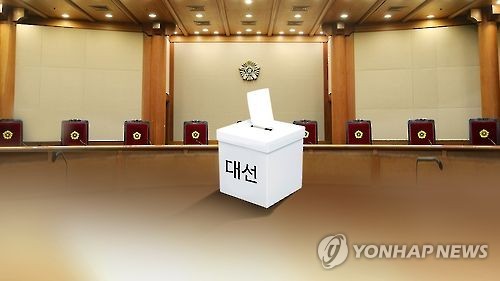Korean economy needs concerted efforts to improve growth
By KH디지털2Published : March 10, 2017 - 12:02
Although the Constitutional Court's historical ruling lifted the thick uncertainties stemming from the impeachment of the incumbent president, it is time for the South Korean economy to focus more on overcoming the current strong challenges like intensifying Chinese issues and diminishing growth potential, experts said.
The top court ruled to remove President Park Geun-hye from her office some three months after she was impeached by parliament on Dec. 9 on charges of letting a close friend meddle in state affairs.
The top court ruled to remove President Park Geun-hye from her office some three months after she was impeached by parliament on Dec. 9 on charges of letting a close friend meddle in state affairs.

With the final decision, an election to pick her successor must be held within 60 days, and many expect it to fall on May 9.
Over the past three months, Prime Minister Hwang Kyo-ahn has taken over the role of acting president, and he is expected to continue to serve the interim post for the next two months until the presidential election.
Economists pointed out that the South Korean economy has lost its bearing and fallen into a protracted slump due to a leadership void in economic policies amid the monthslong political turmoil.
Businesses postponed their investment and employment plans for the new year, while households closed their wallets due to an uncertain future.
The country's gross domestic product rose 0.4 percent in the October-December period compared with the previous quarter, down from a 0.6 percent on-quarter gain tallied in the third quarter.
The weak showing is due to a drop in government spending and private consumption.
Retail sales index rose 2.4 percent on-year in the last quarter of 2016, slowing down from 6.2 percent and 3.2 percent from the second and third quarters, respectively.
"For months, the government has been reluctant to push forward with any policies to deal with massive downside pressures abroad,"
said Lee Phil-sang, a professor at Seoul National University. "From now on, the fiscal authorities should stand firm and go back to work under the new leadership."
He said it is urgent to solve the pending trade issues related with China and the United States, the biggest and second-biggest trade partners of South Korea, respectively.
Tensions are building between South Korea and China as Seoul has sped up plans to station the Terminal High Altitude Area Defense (THAAD) on its soil. Beijing has strongly objected to the decision, saying the high-tech radar will be used to spy on its military and hurt its national interests.
China has taken a series of provocative actions against Korean cultural products and businesses for months. Recently, Beijing told its major travel agencies to stop selling tour packages heading to Korea, while reports showed that many retail shops in China run by South Korean retail giant Lotte were put under business suspension by local authorities.
Such measures dealt a blow to South Korea, as exports to China accounted more than 25 percent of its entire exports worth US$494.2 billion in 2016.
Also, many fear that the US president will renegotiate free trade agreements that the world's largest economy now has, including the North American Free Trade Agreement and the Korea-US FTA, which took effect in 2012. Trump has denounced the Seoul-Washington FTA as a job destroyer, hinting that he would seek to revise the terms.
Asia's fourth-largest economy posted a $23.3 billion trade surplus with the United States last year. This is equal to 26 percent of the country's total trade surplus.
The massive surplus has been under fire from the US
government, which could designate South Korea as a currency manipulator.
"We have lots of things to do. The economic policymaking line has to take a firm stance and do what it has to do," the professor said.
But the expert noted that the country may face a deeper rift in public opinion if those who have opposed the impeachment of President Park refuse to accept the ruling.
"If the nation is divided, it must be the biggest negative factor for the economy, which is already experiencing tough headwinds at home and abroad," the professor said. "We also have to pick a new president who is determined to bridge the gap and run better economic policies in the upcoming election."
Other economists also called for concerted efforts to minimize the impact of the leadership vacuum on the economy and fend off fallout from possible external risks such as a US rate hike and challenges from China.
"It is time to turn our eyes to the economy. The government should stabilize the economy and help business and households in the face of difficulties coming from inside and outside of the country," said Kim Jung-sik, a professor at Yonsei University.
He said the new leader will inherit a limping economy that struggles with heightened risks from China and the US
Kim Chun-gu from the Hyundai Research Institute said it is important for policymakers to clear economic uncertainties until a new president takes office.
"It's good to remove uncertainties that have gripped the entire country for the past few months," he said. "Now, the incumbent economic leaders have to reduce lingering Chinese and US-led risks." (Yonhap)




![[Weekender] Korean psyche untangled: Musok](http://res.heraldm.com/phpwas/restmb_idxmake.php?idx=644&simg=/content/image/2024/05/02/20240502050841_0.jpg&u=)



![[Eye Interview] 'If you live to 100, you might as well be happy,' says 88-year-old bestselling essayist](http://res.heraldm.com/phpwas/restmb_idxmake.php?idx=644&simg=/content/image/2024/05/03/20240503050674_0.jpg&u=)








![[Herald Interview] Director of 'Goodbye Earth' aimed to ask how we would face apocalypse](http://res.heraldm.com/phpwas/restmb_idxmake.php?idx=652&simg=/content/image/2024/05/03/20240503050732_0.jpg&u=)
